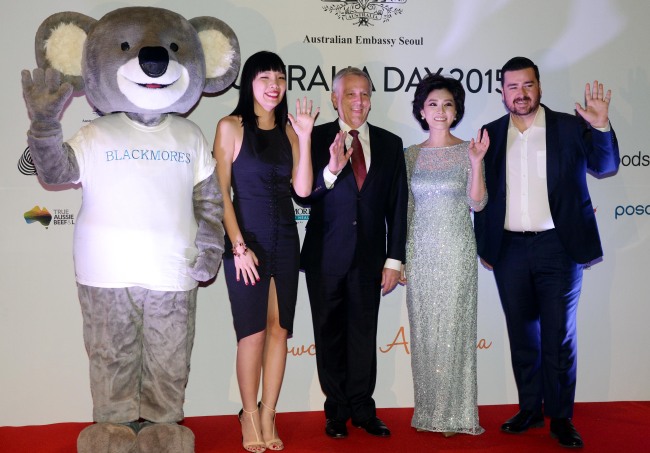Following is contributed by the Australian Embassy in Seoul to mark Australia Day. ― Ed
Celebrated annually on Jan. 26, Australia Day is the official national day of Australia. It is a day to celebrate our rich culture, ethnic diversity and natural beauty, as well as reflect on what we have achieved and what we can be proud of in our great nation.
Australia is one of the most ethnically diverse societies in the world, with almost one in four residents born overseas.
This wide variety of backgrounds, together with the culture of indigenous Australians who have lived on the continent for more than 60,000 years, has helped create a distinctive Australian identity and spirit.
Korean-Australians have played, and continue to play, an important role in the Australian story.
Australia welcomed its first wave of Korean immigration in the early 1970s, and it is estimated that over 88,000 people of Korean descent now call Australia home.
Celebrated annually on Jan. 26, Australia Day is the official national day of Australia. It is a day to celebrate our rich culture, ethnic diversity and natural beauty, as well as reflect on what we have achieved and what we can be proud of in our great nation.
Australia is one of the most ethnically diverse societies in the world, with almost one in four residents born overseas.
This wide variety of backgrounds, together with the culture of indigenous Australians who have lived on the continent for more than 60,000 years, has helped create a distinctive Australian identity and spirit.
Korean-Australians have played, and continue to play, an important role in the Australian story.
Australia welcomed its first wave of Korean immigration in the early 1970s, and it is estimated that over 88,000 people of Korean descent now call Australia home.

Korea is Australia’s third-largest source of international students, third-largest source of working holiday-makers and eighth-largest market for inbound tourists. With the active Korean community in Australia and the growing number of alumni in Korea the people-to-people links between the two countries are extensive and constantly expanding.
The Australian Government is committed to ensuring that more young Australians have an opportunity to live and study in Korea. Under the New Colombo Plan, which will begin in Korea this year, we aim to build on the existing education, cultural and people-to-people links that exist between our two countries.
Australia’s openness to new people and ideas makes it a very creative place, having produced more Nobel Prize laureates per head of population than any other country, most of whom worked in scientific research.
Australia is an ideal partner for Korea in relation to President Park’s “creative economy” initiative, with strengths in medical and materials research and world-ranking universities.
The country has a lot to offer the Asia-Pacific region.
We have strong institutions, a multicultural and highly skilled workforce, and a productive, open and resilient economy. Australia, like Korea, is committed to economic reform, and sound decisions made by both countries have enabled us both to avoid the worst impacts of the Global Financial Crisis. We are proud to stand with Korea as being among the very few OECD countries that did not suffer a recession during the financial crisis.
Australia and Korea are natural economic partners, with two-way trade valued in excess of 32 billion Australian dollars ($25 billion).
On a per capita basis, Australia imports more Korean products than any other OECD economy. Our two economies are around the same size, but we have different strengths and very complementary economic structures, which allow us to both benefit greatly from bilateral trade and investment.
The past year has been momentous for the relationship between Australia and Korea with the entry into force on Dec. 12, 2014, of the Korea-Australia Free Trade Agreement. KAFTA is a world-class, comprehensive agreement that encompasses many areas of our economies, and was Australia’s first free trade agreement in North Asia.
With two tariff cuts in quick succession ― one on Dec. 12, 2014, and another on Jan. 1 ― KAFTA makes it even more economically beneficial to do business with each other.
While the two countries share a healthy trade in goods and services, bilateral investment flows are currently smaller than the potential in both our economies.
Coming at a time of slowing growth, investment can act as a kind of stimulus for both our economies. KAFTA provides improved access and protection for investors and investments. Growing investment ties will underpin the future of our economic relationship.
In addition, Australia and Korea have a strong defense and security relationship, which dates back to the Korean War.
Australia was amongst the first countries to come to Korea’s aid. Over 18,000 Australian troops served on the front line ― 339 of whom lost their lives.
Today Australia remains an active member of the United Nations Command, works closely with Korea’s armed forces and is committed to maintaining peace and security on the peninsula.
Given the ever strengthening bilateral ties between our countries, we are delighted to have an opportunity to share Australia Day with Korea, and to celebrate the many strengths of a dynamic and modern Australia.
-
Articles by Korea Herald







![[Hello India] Hyundai Motor vows to boost 'clean mobility' in India](http://res.heraldm.com/phpwas/restmb_idxmake.php?idx=644&simg=/content/image/2024/04/25/20240425050672_0.jpg&u=)










